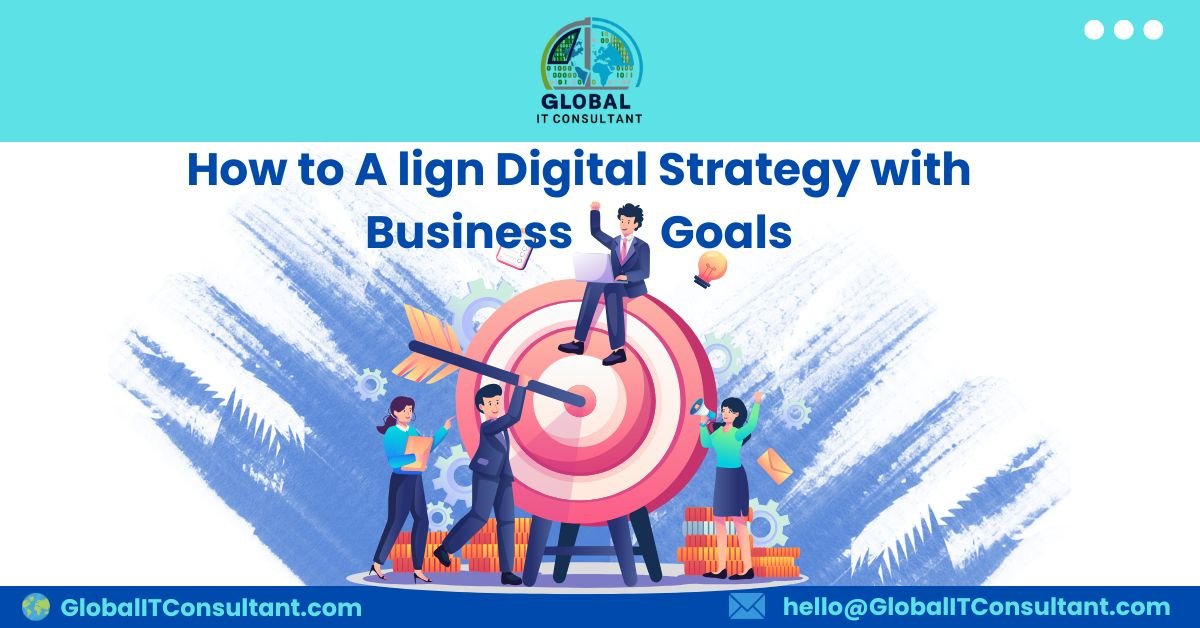By Global IT Consultant
In 2025, digital transformation isn’t just about adopting technology—it’s about ensuring that every digital initiative serves a clear business purpose. For companies in the U.S. and beyond, failing to align digital strategy with business goals leads to wasted investments, internal confusion, and missed opportunities.
At Global IT Consultant, we specialize in helping businesses—from startups to Fortune 500s—build digital strategies that are tightly integrated with their growth and performance objectives. In this blog, we’ll walk you through the key principles and steps to ensure your digital strategy drives real business outcomes.
🎯 Why Alignment Matters
Digital projects that lack strategic alignment often fail because they:
- Solve the wrong problems
- Lack executive sponsorship
- Can’t demonstrate ROI
- Disrupt rather than enhance operations
When digital strategy aligns with business goals, companies see:
- Improved decision-making
- Higher customer satisfaction
- Scalable growth
- Greater organizational agility
🧭 Step-by-Step Guide to Strategic Alignment
✅ Step 1: Define Measurable Business Goals
Start with specific, outcome-driven goals. These might include:
- Increasing customer retention by 20%
- Reducing operational costs by 15%
- Expanding into 3 new markets
- Enhancing employee productivity
Without clear business objectives, digital efforts become aimless.
💡 Step 2: Identify Key Challenges and Opportunities
Analyze your current operations to determine where digital solutions can create the most impact.
Ask questions like:
- Where are we losing time or money?
- What do customers complain about most?
- What manual processes can we automate?
- Which markets or segments are underserved?
⚙️ Step 3: Map Technology to Business Objectives
For every goal, identify the right technological enabler.
| Business Goal | Matching Digital Solution |
|---|---|
| Improve CX | CRM, chatbots, UX redesign |
| Cut costs | Process automation (RPA) |
| Enter new markets | E-commerce platforms, multilingual SEO |
| Empower teams | Cloud collaboration tools |
Don’t deploy tech for tech’s sake—ensure it supports a goal.
👥 Step 4: Involve the Right Stakeholders
Digital strategy is cross-functional. Include:
- C-Suite for strategic direction
- IT teams for execution planning
- Operations & HR for employee enablement
- Marketing & Sales to align with customer needs
Pro Tip: Use cross-department workshops to gain alignment and buy-in early.
📊 Step 5: Set KPIs and Success Metrics
Make success measurable. Track:
- Revenue growth
- Cost savings
- Customer acquisition and retention
- Time-to-market
- Employee adoption rates
Use real-time dashboards to monitor performance and adjust accordingly.
🔄 Step 6: Keep Strategy Agile
Business needs evolve—your digital strategy should too.
- Review quarterly
- Adapt based on feedback and results
- Keep communication channels open between departments
📌 Real-World Example
Case Study: A logistics company in Illinois wanted to reduce delivery delays.
Digital Strategy: Implemented real-time tracking + route optimization software.
Business Outcome: Reduced average delivery times by 18%, increased customer satisfaction, and cut fuel costs by 12%.
🌐 The Role of a Digital Consultant
Aligning digital strategy with business goals often requires an outside perspective. A digital consultant helps:
- Audit existing systems
- Bridge the gap between tech and business teams
- Recommend scalable solutions
- Accelerate implementation with proven frameworks
At Global IT Consultant, we act as your strategic partner—not just a vendor.
✅ Final Thoughts
When aligned properly, your digital strategy becomes a powerful engine for business growth. It’s not about adopting the latest tools—it’s about selecting the right ones, at the right time, to achieve your most important objectives.
Want to align your digital vision with business success?
👉 Contact Global IT Consultant for a custom strategic session.

